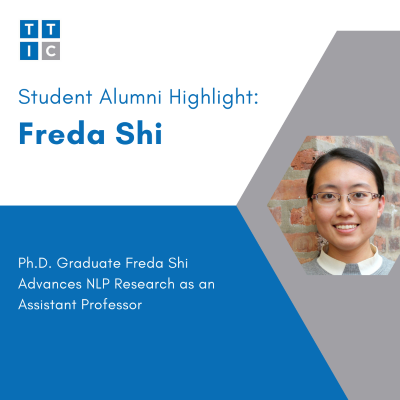
Student Alumni Highlight: Freda Shi
Freda Shi, Ph.D. graduate from TTIC’s class of 2024 (advised by Professors Karen Livescu and Kevin Gimpel), joined the Cheriton School of Computer Science at the University of Waterloo as a tenure-track Assistant Professor in July 2024. In September 2024 she was named a CIFAR AI Chair and a faculty member at the Vector Institute.
Freda’s research focuses on computational linguistics and natural language processing, aiming to deepen the understanding of both natural language and human language processing. She explores how these insights can enhance the design of more efficient, effective, safe, and trustworthy NLP systems. She is particularly interested in learning language through grounding, computational multilingualism, and related machine learning aspects.
Her current research at the University of Waterloo explores the intersection of large language models and their use as human cognitive models while also advancing the modeling vocabulary of these systems.
“I frame this broadly as learning language through grounding—not just in the traditional sense of linking language to vision but more generally as leveraging distant supervision from reliable sources,” Freda said. “This includes cross-lingual grounding, such as transferring knowledge from high-resource to low-resource languages, as well as translating natural language into executable code. I’m particularly excited about research directions that contribute to this broader vision.”
Freda received her Bachelor’s of Science in Intelligence Science and Technology at Peking University before joining TTIC as a Ph.D. student, where she was advised under Professors Karen Livescu and Kevin Gimpel with a research focus on natural language.
“My advisors were very kind, supportive, and knowledgeable,” Freda recalled. “Whenever I had a bunch of scattered ideas and wasn’t sure if they were good research ideas, my advisors were always smiling and providing constructive feedback, no matter how crazy they seemed. They also encouraged me to always keep a thesis outline in mind, which helped me stay focused on a clear research direction.”
Freda also reflected on the support systems she had at TTIC, even amid the challenges of the ongoing COVID-19 pandemic.
“Women at TTIC offered me wonderful support during my time at TTIC,” Freda said. “I also made wonderful friends, and I had a happy Ph.D. journey.”
One of the courses that had the biggest impact on her was TTIC 31230, “Fundamentals of Deep Learning,” taught by Professor David McAllester.
“That course significantly contributed to my knowledge base connecting my practitioner experience to the fundamentals of mathematical formulation,” Freda said. “I’m teaching a course at Waterloo right now, and I’m incorporating part of the knowledge from TTIC 31230 into my current course.”
During her time as a student at TTIC, Freda’s work was recognized with best paper nominations at Association for Computational Linguistics (ACL) 2019 and 2021, and was supported by a Google PhD Fellowship. Her Ph.D. thesis, “Learning Language Structures through Grounding,” was awarded Thesis of Distinction from TTIC.
As Freda was nearing graduation, after pursuing a few internships in industry, she chose to pursue academia due to the flexibility and freedom of research. Now, as a professor, one of the most rewarding aspects for her is mentorship.
“If I could choose, I’d be a student forever,” she joked. “But now, I get to support students who remind me of myself just a few years ago. Seeing their excitement and being part of their academic journey is incredibly rewarding. I’m excited that I’m making an impact on them, and I hope it’s a positive one,” Freda said. Although she jokes that she would love to be a student forever, she finds fulfillment in supporting and guiding the next generation of researchers.
For current and future Ph.D. students, her advice is simple: “Stick to what excites you most and try to balance impact with your interests, if and only if necessary. Once you are sure about that, don’t be afraid of failure.”

